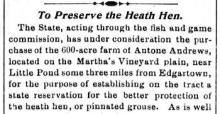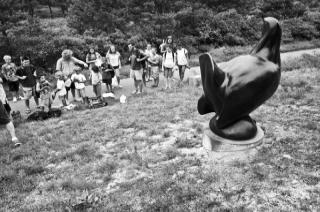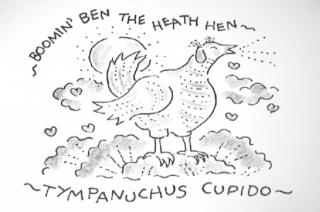Heath hen
2014
The heath hen is currently being proposed as a possibility for de-extinction by an organization that aims to coordinate projects that use genetics to rescue endangered and extinct species.
2012
How do you get kids to care about a bird that no longer flies to the treetops, nor whistles to greet the day? Appeal to their senses and their incomparable imaginative faculties, says Todd McGrain, artist, arts educator and activist.
Mr. McGrain did just that last week, during his visit to Sense of Wonder Creations summer camp, when he asked children to touch a reproduction heath hen, listen to its call and imagine what it must have looked like.
2009
Note: The Heath Hen, once a plentiful bird throughout New England, was last seen by James Green in West Tisbury on March 11, 1932.
The Ballad Of Boomin’ Ben
(The Tragic Tale of the Last Heath Hen)
I looked for my lady,
hoped she was near
playing “hard-to-get” games
in the Spring of that year.
I searched and I searched
under brush, by the sea;
2008
The Last Heath Hen
From the Vineyard Gazette editions of March, 1933:
2004
Now a genetic study of the skins of scores of heath hens, all of them from the Vineyard, shows that the Island bird, although it looked and behaved much like its supposed parent species in the Midwest, was a wholly distinctive creature. Genetically it was more different from the greater western prairie chicken - that supposed parent species - than the Midwestern bird is from any other family member in its genus, which includes the lesser prairie chicken, the endangered Attwater's prairie chicken of eastern Texas, and even the sharp-tailed grouse. It is possible that instead of being a subspecies of the prairie chicken - which scientists have considered it to be since it was first typed in the last years of the nineteenth century - the heath hen might have been a species unto itself.
1933
Somewhere on the great plain of Martha’s Vineyard death and the heath hen have met. One day, just as usual, there was a bird called the heath hen, and the next day there was none. How he came to his end no human being can know. But the death of wild birds is a violent death. The eye becomes dimmed, the beat of the wings lags ever so little, the star of fortune blinds for a fraction of a second it is enough. An enemy strikes and death has come.






